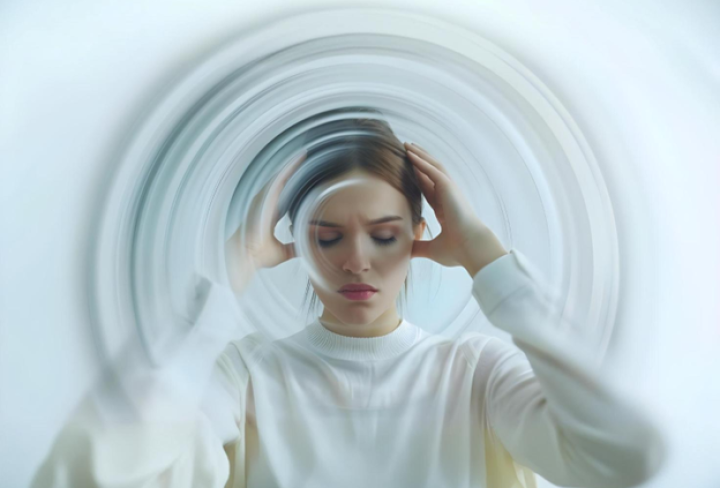Vertigo is often misunderstood and wrongly lumped together with dizziness, despite being a separate and distinct issue. Vertigo feels like the world is spinning, even when you’re still. However, this isn’t just for older folks; it can affect anyone. Common vertigo misconceptions and no small amount of incorrect vertigo assumptions make it hard to understand what sufferers go through. Many think vertigo and dizziness are the same, but they’re not. Dizziness is like feeling lightheaded, while vertigo feels like rotational spinning. Understanding these differences can take us a long way in demystifying the false beliefs about vertigo and guiding any of us who might encounter this puzzling sensation.
Understanding Vertigo and Dizziness: Unveiling the Reality
Vertigo and dizziness, though often used interchangeably, are quite different. Vertigo is a specific type of dizziness that makes the world seem like it’s whirling around you. This is more of a sensation of motion when there isn’t any. On the other hand, dizziness is a broader term. It can mean various feelings like faintness or unsteadiness. Understanding this helps unravel some vertigo symptoms misconceptions that people naturally develop. People often don’t realize that vertigo is related to balance systems in our body, linked to the inner ear. It’s the feeling that you’re tilting or that everything around is revolving. This clarity can lower incorrect vertigo assumptions and promote more accurate conversations on the matter.
Unpacking the Causes: More Than Just Inner Ear Disorders
While many relate vertigo mainly to ear troubles, its causes are broader. Sure, inner ear issues can be a culprit, but there are others. Vertigo myths vs facts reveal that migraines are a significant cause of vertigo. Also, neurological factors and even certain medications play a role. Knowing these varied causes combats false beliefs about vertigo, making it clear that vertigo isn’t cut and dry.
Debunking Common Vertigo Misconceptions: The Top 5 Myths
Let’s get into the common vertigo misconceptions that often lead to confusion and worry:
- Myth 1: Vertigo Only Affects the Elderly – Many believe vertigo affects only older adults. This myth is easy to bust! People of all ages can experience vertigo. Kids and young adults aren’t immune. Some young people experience vertigo symptoms misconceptions when they think it’s reserved for their grandparents.
- Myth 2: Vertigo is a Permanent Condition – The term “permanent” can be frightening. Most cases of vertigo are temporary. Episodes can last minutes or hours, but they’re often treatable. Highlighting this can relieve anxiety stemming from incorrect vertigo assumptions.
- Myth 3: Vertigo is Just a Disease – Vertigo isn’t a disease; it’s a symptom. It indicates something else is at play, like migraines or inner ear disturbances. Knowing this dispels false beliefs about vertigo.
- Myth 4: Vertigo is Always Life-Threatening – Sometimes, vertigo might signal a serious health issue, but that’s not always the case. Many cases are benign, though still unpleasant. Educating on vertigo myths vs facts helps put this myth to rest.
- Myth 5: Vertigo Can Be Self-Treated with Home Remedies – While some might find relief in home solutions, vertigo often needs medical insight. Ignoring this could delay proper treatment. Dispelling common vertigo misconceptions like this one emphasizes the importance of professional care.
Personalized Care: Breakthroughs in Vertigo Treatment
Treatment for vertigo is now super personalized. Doctors create treatment plans just for you, considering all aspects of your health. Lifestyle changes can help, too. Simple exercises to overhaul balance functions can be part of your plan. Medical interventions are tailored, addressing individual needs, crushing vertigo symptoms misconceptions with each success.
Beyond Medication: Comprehensive Approaches to Management
Vertigo isn’t managed solely with medication. A comprehensive approach often includes vestibular rehabilitation therapy. This therapy helps improve balance and reduce dizzy spells. Working with a trained therapist provides better guidance. These methods break down false beliefs about vertigo, proving that lasting changes in lifestyle can lead to relief.
Navigating Healthcare: Asking the Right Questions About Vertigo
When you talk to your doctor about vertigo, asking the right questions can help. Inquire about potential causes specific to you. Understand which tests can pinpoint your issue. Clarify how personalized your treatment plan can be. These steps clear up incorrect vertigo assumptions, enabling informed health decisions.
Conclusion and Call to Action: Empowering Readers Towards Informed Health Choices
We’ve tackled common vertigo misconceptions, shown the difference between vertigo symptoms misconceptions and reality, and busted myths. Take proactive steps in health discussions, armed with this knowledge. Engage more confidently with your healthcare provider and share your vertigo stories with others. Education and conversation are vital to unraveling vertigo myths vs facts, paving the way to informed wellness.

